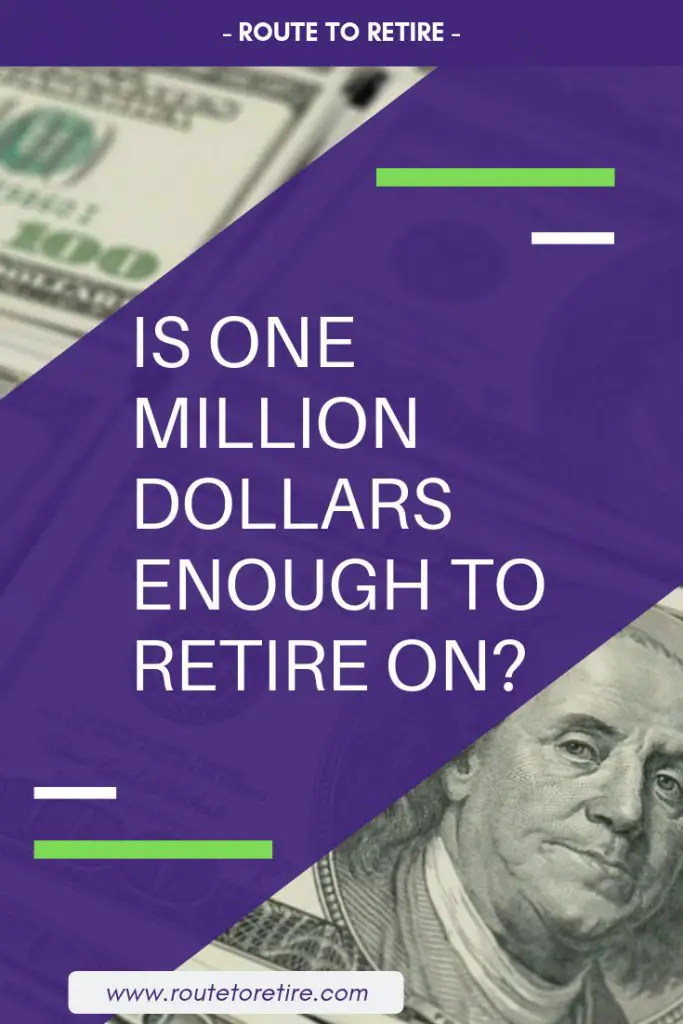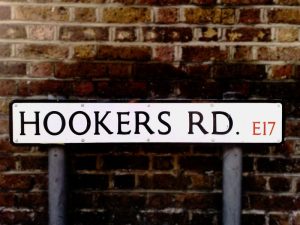Disclosure: This post contains affiliate links and we may receive a referral fee (at no extra cost to you) if you sign up or purchase products or services mentioned. As an Amazon Associate, I earn from qualifying purchases.
 One million dollars. It’s the coveted goal for many.
One million dollars. It’s the coveted goal for many.
Maybe it’s something you think is way out of reach. Or maybe you’re on the other side of the spectrum and close to it or even long surpassed that number.
Regardless, one million dollars just seems to be a good round number in our heads to strive for reaching. In fact, it’s a number that many folks have had as their target number for financial independence or retirement for decades.
You suddenly gain the status of “millionaire” and you become part of the “7-digit club.” What could be more exciting than that?
However, we all know that the dollar ain’t worth what it used to be. Inflation loves to strip away the power of the dollar and that means your purchasing power to cover all your expenses has become a lot less over the years.
So that begs the question… is one million dollars enough to retire on?
One million dollars in 1990
Let’s take a little walk back in history with a random year – 1990. Ah, the good old days. We had some fun times then:
- Windows 3.0 came out – remember that? Yeah, most folks don’t. That was still five years before Windows 95 came out!!
- Home Alone, Ghost, Pretty Woman, and Edward Scissorhands hit the big screen.
Ah, yes – Julia Roberts plays Vivian, a prostitute that gets snubbed at an over-priced store on Rodeo Drive in Beverly Hills. But then she gets the hook-up from Barney, does a bunch of shopping elsewhere, and goes back to the initial store flaunting all the bags in her hands…
Vivian: You people work on commission, right?
Store associate: Yeah.
Vivian: Big mistake. Big. Huge. I have to go shopping now.
- 1990 was also the year that Milli Vanilli producer revealed that the singers were actually lip-synching the songs from the album that garnered them a Grammy. Ouch.

My brother had just seen the duo in concert right before this scandal came out. That provides a lot of good ammunition to torment a younger brother with!
But enough about pop trivia of 1990 – let’s get to the point. I was fifteen years old at that time (yeah, I’m old). A million bucks sounded like a fortune back then. I also didn’t know what the hell inflation was at that time either.
Yeah, well now I do know about inflation and how quickly it can erode everything you’ve saved. That means it can make a difference in your savings goals.
When we’re talking about a million big ones, let’s see how we would have fared. According to DollarTimes, $1,000,000 back in 1990 is actually about $1,954,988.10 in today’s dollars (2018).
Let that sink in for a minute. From today’s perspective, if you were aiming to be a millionaire back in 1990, you were really striving to have almost $2 million! That’s a big difference… huge!
Being a millionaire 28 years ago was a much bigger achievement than it is today.
If you become a millionaire today, your purchasing power as compared to 1990 is much more limited. And that, my friend, is the real issue. One million dollars is not going to afford you the same lifestyle as it would have long ago.
Is it “good enough” though? Hmm, good question!
The good old 4% rule!
 So what does a million bucks socked away actually get you? Well, at its simplest, we can turn to the 4% rule for some help.
So what does a million bucks socked away actually get you? Well, at its simplest, we can turn to the 4% rule for some help.
The whole idea behind the 4% rule is to provide somewhat of a guideline for a safe withdrawal rate. Based on research known as the Trinity Study, the data shows that you should be able to pull out 4% of your portfolio (adjusted for inflation) every year and have a 98% rate of success of not running out of money.
Be aware though that this is based on historical data (no one knows what the future holds!). It also assumes a portfolio consisting of 75% stocks and 25% bonds and a time-span of 30-years. That timeframe is much less than early retirees are planning on living.
Regardless of the caveats, this tends to be a good starting point for most of us and a fair number to use for this writing. For more info on the 4% rule, my post Is the 4% Rule Safe to Use in Retirement Planning? should get you pointed in the right direction.
So based on this information, the 4% rule would set you up to take out $40,000 on an annual basis of your retirement (again, adjusted for inflation every year thereafter). That’s the math and maybe it gets adjusted slightly based on different factors, but it comes down to one question you have to ask yourself…
Would $40,000 per year cut it for you and your family?
Unfortunately, I can’t answer that for you – for some of you, that’s plenty of dough per year with breathing room if needed. For others though, that’s like taking a major haircut… one you wouldn’t want to scale back to.
To even get in the ballpark on knowing if that would work, you need to know what your annual expenses are currently. If you’re not already doing so, I really recommend using Empower (formerly Personal Capital) (completely free!) to easily track both your expenses and investments – I use it and love it!
Then you’re able to make some assumptions on the changes in your expenses such as:
- Your mortgage may or may not be paid off
- Maybe you plan to downsize or move to a different place in the country or world
- Health care costs are like to change
That should give you an idea if $40,000/year is feasible to even consider.
But what about…
 We wouldn’t be doing our due diligence in talking about this kind of money without touching on some of the complexities we might have on that one million dollars. For instance…
We wouldn’t be doing our due diligence in talking about this kind of money without touching on some of the complexities we might have on that one million dollars. For instance…
⬥ Your investment accounts
If your one million dollars is invested in after-tax accounts like a Roth IRA, you’re golden! That means you’ve already contributed to it with post-tax dollars and you’re not going to owe anything on your withdrawals. Sweet!
However, that’s not generally going to be the case. Most of us have our investments spread across accounts of different tax-types. I would venture to guess that in the majority of cases, a large component of many investors’ portfolios would be their 401(k), 403(b), or 457 plans.
And because those are tax-deferred accounts, we have a little more complexity in planning. Think about it – just because you have a million in the account, doesn’t mean you get to keep all of it. The taxman still needs his cut and depending on your retirement strategy, that could be a sizable piece of the pie.
⬥ Your personal strategy
Speaking of retirement strategy, that’s going to make a huge difference in how your million works for you. If you’re an early retiree and relying on the money in your tax-deferred retirement accounts, you’ll need to access it using non-traditional methods to avoid penalties.
This could be through strategies such as a Roth IRA Conversion Ladder, Rule 72(t), or the Rule of 55. Each approach has its pros and cons so it’s important to understand the nuances completely before running with one.
The tax implications will vary and the possibility of having other income coming in from other sources could also affect your tax rate. It’s not hard to move into a higher tax bracket because you have other money rolling in or you’re withdrawing larger amounts from your tax-deferred accounts. And when that happens, the money over the lines in the higher brackets is going to cost you more… and that’s less to live on.
⬥ Other investments

We’ve talked about some investment accounts, but many of us have our money spread out in other areas that are throwing income our way…
- Real estate
- Small businesses
- CDs / Treasury bills / Money market
- Peer-to-peer (P2P) lending
- Royalties
- Cash-on-hand
- Whatever else you might have
I can’t emphasize it more that having your money spread across different (but sound) avenues is one of the smartest things you can do. Putting all your eggs in one basket can be hazardous to your future.
But with these various investments, you’ll also get various returns. Simply put, your one million dollars might be spinning you off more or less money than the assumed safe withdrawal rate we talked about earlier.
That can hinder (or help) the amount you can live off each year.
⬥ Ugh… the unknown
One of the “fun” parts of early retirement is you never know what the future holds. Because of that, you’re never going to be able to plan 100% accurately.
The biggest of these unknowns for most of us in the U.S. is going to be health care. The prices of health care here can be staggering and, unfortunately, it’s probably only going to get much worse before it possibly has a chance of getting better.
How do you plan for problems like this? Maybe you find that $40,000/year is a sure bet for you now, but what if the price of health care skyrockets even more and other choices like health care sharing ministries get eliminated as options?
It’s hard to plan for the unknowns, but you still need to try to take these kinds of things into account as best as you can.
Our situation

I’m pretty forthright with our finances. We hit a million dollar net worth in early 2017. I’ll admit, it was a little bit exciting… until I realized that not much really changes in your life with that number.
Then, of course, you don’t know what the markets are going to do. If you look at my net worth page, you’ll see that we peaked at a little more than $1.2 million. After that, the stock market’s been a little shaky and we sold our house. Once things settled, we’re down to a bit more than $1.1 million.
I don’t think the market’s done with its fun and it’s extremely possible that our net worth drops under the million-dollar mark in the near future.
And that’s Ok, but I think it’s fair to say that we’re planning to retire at the end of this year with about one million dollars as our number… and that’s with us having our daughter to support! Whoever said you can’t retire with kids?!
Our expenses are low and with our move to Panama in the summer of 2019, our cost of living will go down even more. Nevertheless, we’ve made sure to keep a couple of things in mind just to be a little more conservative.
- We planned as if we’d be coming back to the U.S. That way, if we find out Panama isn’t the place for us, we’re not forced to go back to regular jobs if we come back. In the meantime, we have a little more breathing room with our money.
- We also didn’t count on any other income besides our stocks, bonds, cash, and rental property. That means that anything we earn from other projects brings down the amount we need to count on our portfolio to provide.
That second bullet is important. Although I’d love to say that we’re just going to sit around and watch reruns of the Dukes of Hazzard for the rest of my life, I’m going to guess that’s not going to happen. Don’t worry, I’ll make sure to finish watching the whole series regardless.
In all reality, the earlier you “retire” in life, the more likely that you’re going to pursue some other outlet in life. And whatever path you go down, there’s a good chance that it’s going to spin off some money.
FIRE isn’t your traditional retirement. It’s an opportunity to find out what excites you in life so you can chase those passions without money being your sole motivator.
I’m anxious to have the time to continue building up the Route to Retire site. I’m also excited to write a couple more books and maybe start a podcast. And these are just a couple of the things that I know I want to do – I’m sure I’ll go down the rabbit hole of finding other passion projects as well!
I would imagine that the growth of this blog is going to continue to grow as I can focus on it more. I’ve even projected that the site should bring in about $25k per year in the next couple of years.
So for us, one million dollars is a strong foundation and enough for us to retire, but my guess is that we’re really not going to be counting wholeheartedly on it.
So is a million bucks enough?

The answer to this question solely rests on your shoulders. If you have a lavish lifestyle and are inflexible with your plans, then no – one million dollars isn’t going to cut it for you.
Some locations in the U.S. are crazy expensive in and of themselves. If you live in one of those cities, yeah, you’re probably not going to survive on a million bucks for very long.
But, if you’ve planned carefully, keep your expenses down without living too outrageously, and are flexible in life, this isn’t anything that should be too out of reach. In my opinion, it’s not a matter of a million being enough, but rather, your lifestyle needs to drives the ability to make this happen.
You tell me – is one million dollars enough to retire on?
Thanks for reading!!
— Jim

I have done a lot of research myself on the 4% rule and have come to the conclusion that the number is as safe as it can be for retirement – obviously bearing in mind, as you suggested, that no one can predict the future!
Bill Bengen – the creator of the ‘rule’ himself – said that for a time horizon of 30 years, a more accurate number would be 4.5%, which goes progressively down for longer periods. He added “if you plan to live forever, 4% should do it”.
I stopped playing around with my excel simulator when I realised that, even if the correct rate ends up being 4.26, or 3.98, or whatever, we’ll always have plenty of opportunities to make up for the shortfall (eg. get a side job, buy less things, eat out less, move to a smaller place….).
The real thing one should be concerned with is not those ‘small’ fluctuations, it’s more the big ones, the “disasters”. Healthcare is a prime example. A sudden medical bill of 200k is way harder to manage and can really break your business case!
PS On the initial question, is a million enough?, I have to say that I agree with what you said. Getting there feels like ‘YEAH! :)’, and then ‘Mmm…we need double that :(‘
I’m with you on this – as long as we have the ability to be flexible, I think the 4% rule should work for most of us. Heck, I figure that even if our numbers aren’t perfect, I’ll get a part-time job at Home Depot and be happy as a lark! 😉
— Jim
One Million Dollars sounds great on paper, but I don’t think it is enough to retire on. If you are young, it sounds glamorous. If you are older and retired, with the high cost of health insurance, medication and doctor’s bills could eat into that quickly. You may be able to cut your cost of living expenses, but it is hard to cut the cost of aging and dying.
Stupid dying… it ruins everything! 😉 Healthcare and old age definitely add to the fun of planning for retirement. I’m hoping Panama turns out to be a place we enjoy as much as we think we will because coming back to the expected costs here would be heartbreaking!
— Jim
Agree that it’s not a one-size-fits-all answer – lots of variables. For most people who are going to retire at 65, live until mid-80s, take Social Security as soon as they get to Normal Retirement Age, and find a low CoL place…yeah, $1 million might work. Maybe. That’s only if the mortgage is paid off, though. Like I said, lots of variables.
For those of us who want to retire early, no way (IMO). The average 40 year old might not see full Social Security, still has a lot of child expenses in the future, probably still has a mortgage, and Medicare is still 25 years away.
Unless your version of retirement comes with super-low living expenses, a source of income, or both (like Justin at Root of Good), $1m is just a good starting point. Just my opinion. Personally, my “retire now” number is a hair over $2.25m, depending on how it’s split between taxable and tax qualified accounts.
Yeah, I think our family is comfortable with super-low expenses and we’ll inevitably bring in some income from some of the side projects that I’m planning to work on. But I definitely can see how a lifestyle like ours or others like Justin at Root of Good wouldn’t be ideal for a lot of folks. As you put it, it’s not a one-size-fits-all type of question and is something each person needs to really think about to find the right number for themselves.
— Jim
“That second bullet is important. ”
I think your point about being able to generate a bit of extra income to deal with the unexpected while having enough to be okay in most cases is smart. Being slightly conservative with possible flexibility makes it completely doable. Sometimes people try to be too certain, or pretend the numbers are exact, on either the positive or the negative end of the spectrum, and that’s when I worry. You made the right choices to get to your million+, I expect you can make some more to make it work.
Maybe you’ll even be inspired by something in those Dukes of Hazzard reruns!
That idea of being very precise on their number does tend to hold up a lot of folks from pulling the trigger. It also leads to one-more-year syndrome. Though it’s not the end of the world, I tend to hear a lot of early retirees wish they had just let ‘er rip earlier.
Maybe Waylon Jennings was talking about pulling the trigger on FIRE when he narrates the Dukes of Hazzard and says, “There’s trouble and then there’s trouble and the trouble with some trouble is at first…it don’t look like trouble.” 😉
— Jim
Wow, Dukes inspiration already!
Do we need to own a tea estate to drink tea?
Do we need to own a dairy farm to drink milk?
Do we need 1 million to live a $25000 lifestyle?
Think about the Mexican fisherman.
I agree wholeheartedly with this, Adarsh – why do we insist on needing so much?! I found a good post from Scott Alan Turner with the parable for others who might be unfamiliar…
https://scottalanturner.com/the-parable-of-the-mexican-fisherman-and-the-banker/
— Jim
I think a million is enough, but it really depends. If you can generate a little income and put off withdrawal for a while, then you’re golden. The $1 million will keep compounding and soon it’ll be $2 million. You just need to find a way to avoid (or minimize) drawing down the principal. I’m sure you can do it. Good luck!
Thanks, Joe! The good news is that with the Panama move, we’ll hopefully be drawing on less than we would if we stayed here. I think the side income will probably ramp up over the next couple of years, but we’ll see how that plays out.
— Jim
Great post Jim, I think 1 Million in the bank is enough, as long as you have built up multiple streams of income to supplement your lifestyle. Healthcare costs scare me, and its very difficult to plan for a monthly cost 5-10 years in the future. Love the throwback to the 1990’s and the memory of the fraudsters known as Mili Vinilli 😉
Thanks, Jim – multiple income streams is important, that’s for sure. It gets a little dangerous otherwise. Yeah, healthcare is such a tough target – I really hope we can get things figured out in this country… something’s gotta change!
— Jim
Hi,
My take is that one million is more than sufficient for retirement. One may need less than a million to retire. Flexibility is the way to go towards reducing the annual expense which will mean reduced investment portfolio.
I can only vouch for my case in which I am of view that $625,000 is sufficient.
To each of our own.
My two cents of views.
WTK
Thanks, WTK – to each his/her own speaks the truth. Everyone’s a little different in what they’re looking to get out of retirement, but flexibility is definitely key – especially as the number gets lower and lower.
— Jim
I think if you have a paid for house you’re happy in, and 1M to withdraw from, you’re probably in good shape. Our personal goal was 2.5M with 4% withdrawl or 5M with 2% withdrawal (pretty much dividends only). Living on 100K wasn’t an exact number, but it seemed like a good target. The bottom line is the lower you can make your withdrawal rate, the safer it is.
I enjoyed your post on PoF.
Agreed – although $1 million is possible to to sufficiently pull off retiring on, it’s not a forced number. To each his own and in your case, it sounds like you found the right numbers for your lifestyle… congrats!!
And I’m glad you enjoyed the interview on PoF’s site – it was a lot of fun!
— Jim
Hi Jim!
I’m watching your plans for Panama with great interest. My husband and I spent 10 days traveling the country in October to see if it was a good geoarbitrage option for us. We liked El Valle, Boquete, and Pegasi BUT we didn’t see significant savings in housing. Healthcare, taxes, other expenses – definitely some savings. But not so much in housing. Are you and your family planning to rent or buy? What did you see in terms of housing costs?
We really enjoyed Boquete so I’m a bit jealous watching your progress!
– Lindsey
Hi Lindsey – thanks for following our adventure! I actually just did a presentation on this yesterday and expenses was one of the things we talked about. We live in the Cleveland area right now and the cost savings across the board seem really good. The one exception like you mentioned is housing. However, it depends on whether you rent or buy. Talking with Jackie from Panama Relocation Tours, she was filling me in that the average price of a 2 BR casita in Boquete is currently about $700-750/mo. And that includes utilities and sometimes a weekly gardener.
But I’m not seeing those same prices when buying property. It’s not that the prices are crazy – they just seem to be more in line with what we see here. A big difference though is that they have exemptions in place on property tax there. So depending on the value of the house, you might not pay taxes for up to 15 years!
Personally, we’re planning on renting – at least for the short term. I’ll continue to post more about the details as we get closer and especially once we get down there.
If you haven’t checked out Numbeo yet, I’d put that on your to-do list. That site can let you compare costs from whatever city you’re in to Boquete or any other city to give you a better idea.
— Jim
* Pedasi, not Pegasi – Why would autocorrect go to Pegasi? That’s not a thing…
Thanks Jim! I look forward to watching your adventure!